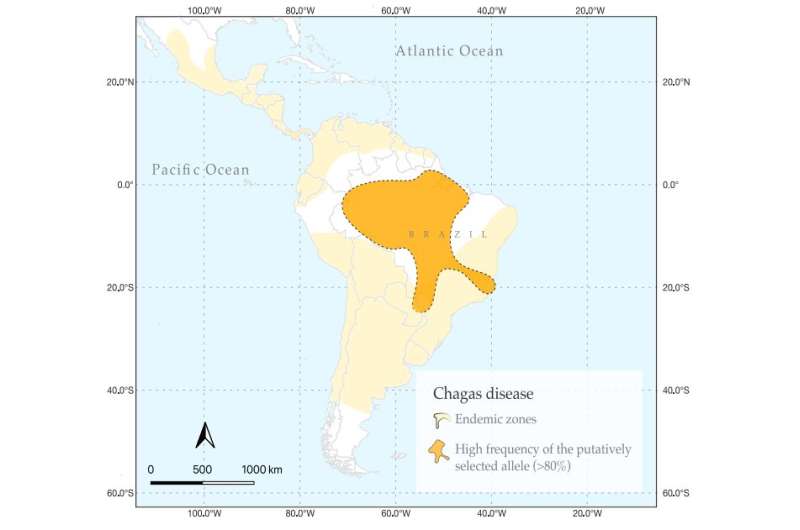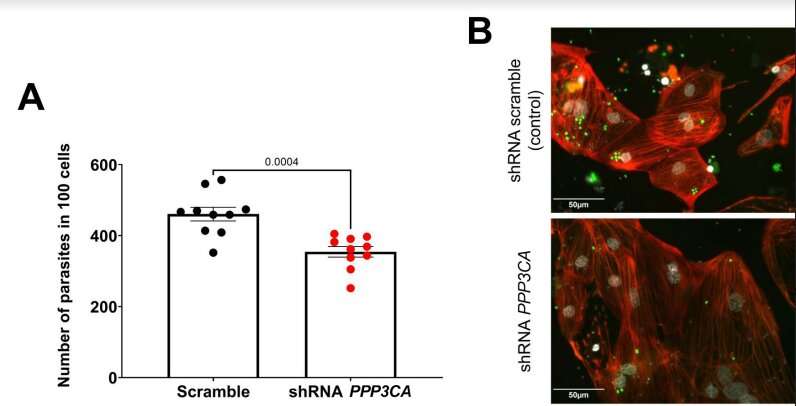This article has been reviewed according to Science X's editorial process and policies. Editors have highlighted the following attributes while ensuring the content's credibility:
fact-checked
peer-reviewed publication
proofread
Genetic adaptations help Amazonian populations resist Chagas infection

Chagas disease affects approximately 6 million people only in Latin America and is one of the leading causes of death in this region. This infectious disease, also called American trypanosomiasis, is caused by the parasite Trypanosoma cruzi (T. cruzi). However, despite being in contact with the parasite, Amazonian populations hardly suffer from Chagas infection. A new study aimed to find out why.
The research has analyzed the genomic data of 118 contemporary individuals from 19 different populations of the Amazon to find traces of genetic adaptation to the Amazon rainforest environment.
"We focused on finding evidence of positive natural selection related to tropical diseases in the Americas," states Tábita Hünemeier, Principal Investigator at the Institute of Evolutionary Biology (IBE-CSIC-UPF), who led the study published in Science Advances.
Through the analysis of the genomes, the study found a high-frequency variant of the PPP3CA gene in the inhabitants of Amazonia that could be responsible for this resistance. To verify its effectiveness, functional studies were carried out in the laboratory. In this way, the study discovered that the variant of the PPP3CA gene reduces the risk of infection by the Chagas pathogen.
Functional studies on the immunological action of the PPP3CA gene against the Chagas parasite
The PPP3CA gene codes for a key protein in the activation of immune cells, the innate immune response, and the internalization of the T.cruzi parasite in human cells. The study detected an abundant variant of this gene in Amazonian populations that is expressed in heart tissue and in immune cells.
The study performed functional studies with heart cell tissue using stem cells, some of which contained the PPP3CA gene variant found in high frequency in Amazonian populations. The results showed that there is less internalization of the parasite in heart cells when they have the gene variant.

"The presence of the PPP3CA gene variant could be the cause of milder disease or less infection in these populations," adds David Comas, Professor of Biology in the Department of Medicine and Life Sciences (MELIS) at the UPF, Principal Investigator at IBE (CSIC-Pompeu Fabra University) and co-author of the research.
Positive natural selection in the Amazonian population due to a pathogen
Study results estimate that the natural selection for Chagas disease resistance began 7,500 years ago after the Amazonian population separated from the Andean and Pacific coast populations.
Supported by previous studies with 9,000-year-old samples, the research concludes that the epidemics would have positively selected the individuals with the greatest resistance to tropical diseases, such as Chagas disease, generating a unique resistance in this population.
Additionally, the study found genetic adaptations associated with behavioral traits such as "novelty-seeking behaviors," a genetic trait that determines the search for new experiences. According to the study, this trait could have been crucial to the hunter-gatherer lifestyle of Amazonian populations in the past, as it enabled them to explore new territories and search for resources.
The study also detected cardiovascular and metabolic traits that are consistent with the genetic predominance observed in previous research, since a 66% rate of obesity, diabetes, and coronary heart disease had already been detected in some Amazonian populations.
More information: Cainã Couto-Silva et al, Indigenous people from Amazon show genetic signatures of pathogen-driven selection, Science Advances (2023). DOI: 10.1126/sciadv.abo0234. www.science.org/doi/10.1126/sciadv.abo0234




















